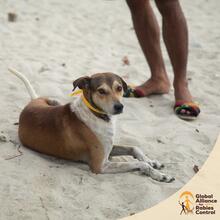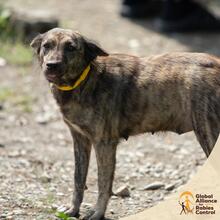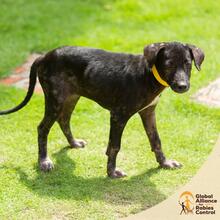Highlighting the benefits of collars given to vaccinated dogs in Zanzibar.
Rabies elimination relies on a simple approach – vaccinate enough at-risk dogs to prevent the disease from spreading. The success of this approach, however, relies on dog owners presenting their dogs for vaccination, which is not always as straight-forward as it may sound. Different beliefs, misinformation about the importance of vaccinating a dog against rabies, challenges associated with travel, and many other challenges prevent people from bringing their dogs to be vaccinated. This is what the rabies community works tirelessly to overcome so that we can reach our goal of ‘Zero by 30’. But GARC and its partners in Zanzibar may have found a practical solution to some of these challenges.
To increase dog owner participation during the 2022 mass dog vaccination campaign in Zanzibar, dogs were given bright collars that indicated that they had received their annual rabies vaccine. While seeing dogs running around with new collars was a great experience, it was only the starting point of our study as we wanted to determine the impact and benefit of the collars for future vaccination campaigns in Zanzibar and elsewhere.
In February 2023, the Zanzibar government and other local partners, supported by GARC and Boehringer Ingelheim Animal Health (BIAH)*, conducted a knowledge, attitude, and practice (KAP) survey across the island during which 600 people were interviewed. To do this, seven 2-person teams of interviewers worked tirelessly for two weeks to interview all 600 people across the island – ensuring that the study met all the scientific requirements to generate reliable and scientifically accurate data.

Of the 600 people surveyed across Zanzibar, 57% said that they felt SAFER when encountering a dog wearing a rabies vaccination collar.
Our findings indicated that people understood that the dog collars meant the dogs had been vaccinated against rabies and thus felt safer sharing their community with those protected dogs. With these vaccinated dogs being more welcome in communities, their welfare would also likely improve, highlighting the benefit of the collars for both people and dogs in the community.

Of the 142 dog owners surveyed across Zanzibar, 64% said that receiving the vaccination collars made them MORE LIKELY to take their dog(s) for rabies vaccination.
This indicated that the dog collars meant that people made the effort and took time out of their day – where they could be working or undertaking other daily activities – to have their dog(s) vaccinated against rabies. Knowing that dog collars could have such a noteworthy impact is extremely important as it shows that dog collars could be used to increase participation during dog vaccination events – in so doing, increasing the overall vaccination coverage during campaign, and helping us reach that all-important herd immunity.

Of the 142 dog owners surveyed across Zanzibar, 95% said that receiving a vaccination collar was an important sign that the dog had been vaccinated against rabies.
While knowing that the dog collars could be used to increase participation during dog vaccination events, we wanted to know whether the people were more likely to take their dogs because they simply wanted a free dog collar or whether they saw the overall benefit of showing the vaccination status of their dog(s). We found that it was the latter as people did not just want free collars but wanted to have their dog(s) showing their vaccination status with pride!
These findings – and others discussed in the scientific publication – suggest that dog collars could not only be used to improve participation during future dog vaccination events, but that they could also play a noteworthy role in how people perceive vaccinated dogs that share the community with them. By providing something as simple as collars to vaccinated dogs, we have not only helped to improve rabies vaccination coverage, but also helped promote better dog welfare by improving the perceptions towards dogs and highlighting the human-animal bond in Zanzibar.
* While GARC provided scientific support, BIAH generously supported the study by providing the dog collars and funding. You can get all the details and more data by reading the full scientific study available here.
Learn more about the work being done in Zanzibar.
Article contributed by: Andre Coetzer (GARC) on behalf of the authors of the scientific publication.